Stay ahead of the curve as a political insider with deep policy analysis, daily briefings and policy-shaping tools.
Request a DemoDon’t let the wag and bark fool you. Heavy drug trade and increased gang violence mean more K-9 forces on Georgia’s streets.
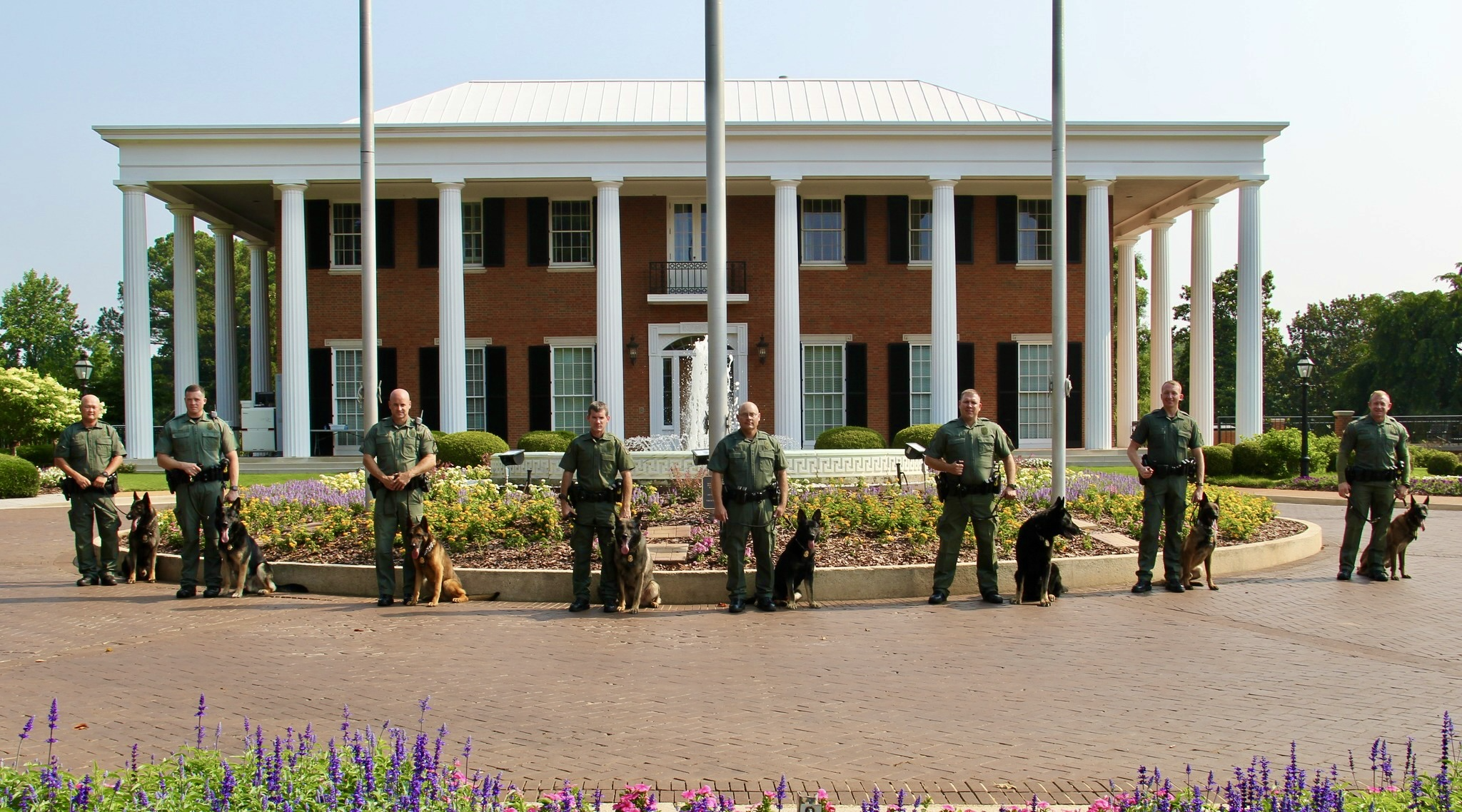
The eight K-9 teams comprising the DNR K-9 unit at the Governor’s Mansion on June 7, 2023, after a K-9 graduation ceremony. (Credit: Georgia Department of Natural Resources)
ATLANTA — Last month 12 new K-9 “officers” received their badges from the Department of Public Safety (DPS), joining their human handlers and fellow law enforcement officers in a ceremony at the Governor’s Mansion punctuated by barks and wags.
The new drug-sniffing, suspect-tracking dogs brought the K-9 unit ranks up to 37. DPS plans to expand to 51 canine officers in FY 2024, joining the Department of Natural Resources and other state law enforcement agencies in increasing their use of K-9 teams to help find evidence, run down suspects and rescue people in distress.
The heavy drug trade and growth in gang-related crime in Georgia are making the dogs’ particular sets of skills more valuable to law enforcement.
K-9s on the roads, and at the Capitol
The newly credentialed DPS K-9s include Rex, a stray German Shepherd plucked for service by First Lady Marty Kemp from dozens of rescue dogs she helped to find homes for last year. A few were given tryouts for K-9 service, but Rex was the only rescue dog who made the cut.
During the ceremony, Kemp praised Rex for his involvement in 14 felony arrests and the seizure of three firearms since completing training with his partner, Trooper First Class Gustabo Deanda Jr. four months ago.
DPS K-9 Unit Coordinator Lt. Chris Matthews, a veteran handler who trained Rex, said the dog had the qualities that he looks for in all potential canine crime fighters — a strong drive to hunt, tenacity, and obedience.
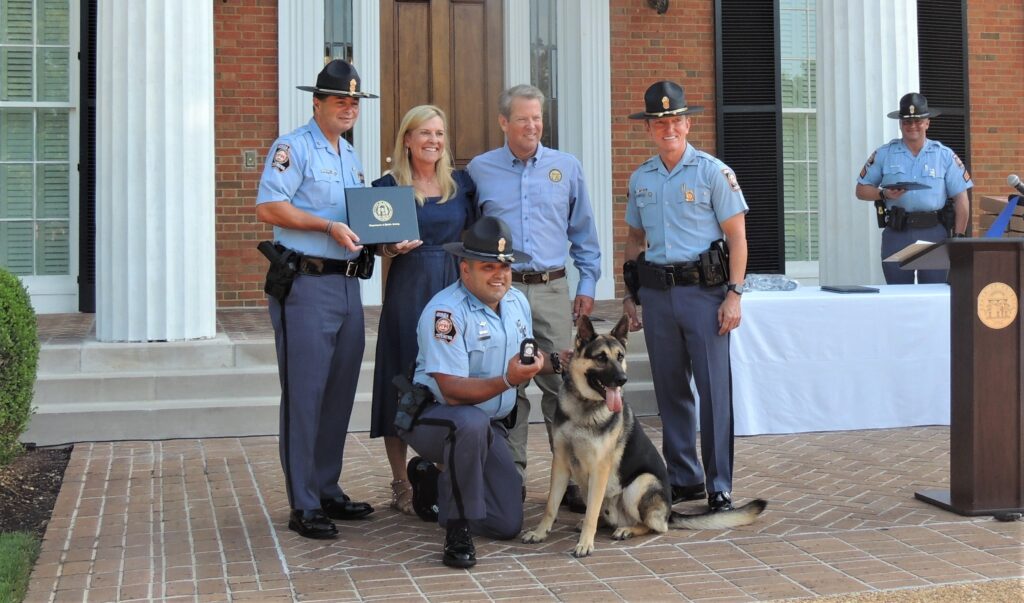
Some 80% of the dogs in the K-9 unit are mixed German Shepherd and Belgian Malinois breeds imported from Europe. They cost between $8,000 and $18,000 and are usually purchased from Georgia vendors who fine tune the rigorous training the dogs received abroad.
DPS dogs are trained for different law enforcement purposes. Currently, 16 single-purpose K-9s are employed for either drug or bomb detection. Twelve of those dogs were trained to identify five kinds of narcotics: cocaine, marijuana, heroin, ecstasy and methamphetamines. The other four were trained to find explosives, and can recognize 21 different odors for bombs and firearms.
Another 16 dual-purpose dogs have the added ability to track and apprehend fleeing suspects. These dogs, Matthews said, must have enough strength and aggressive instinct to hold onto an adult who may put up a fight until their handler can catch up to them.
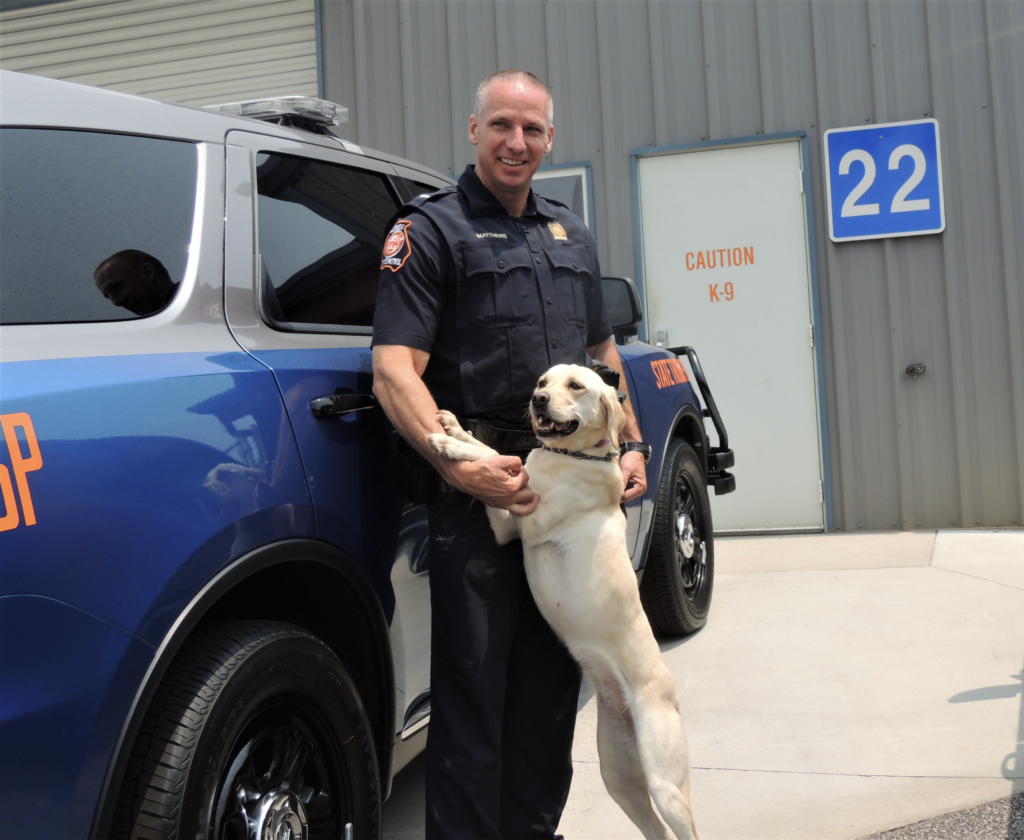
K-9 Officer Figo was such a dog. Last October, the Belgian Malinois followed a command to leap through a broken window into the vehicle of a murder suspect engaged in a roadside standoff with state patrol officers.
The man shot and beat Figo in the head with a gun during the tussle, said Matthews. Officers opened fire, killing the suspect. Figo was rushed to an emergency vet, but succumbed to his injuries.
In 2022, DPS dogs were involved in 800 bomb sweeps by the Capitol Police and 83 cases involving illegal narcotics. The K-9s apprehended 86 suspects without biting, and 20 suspects with bites, called a “catch and hold.”
The work of all the K-9 teams at DPS last year led to 266 felony arrests, 150 misdemeanor arrests, the seizure of thousands of kilos of narcotic drugs, 38 firearms, and $3.4 million in currency.
Statistics for 2023 so far show that K-9 officers at DPS are being deployed more often, making almost as many felony arrests (245), and seizing significantly more meth, heroin, cocaine and firearms through mid-July than they did in all of 2022.
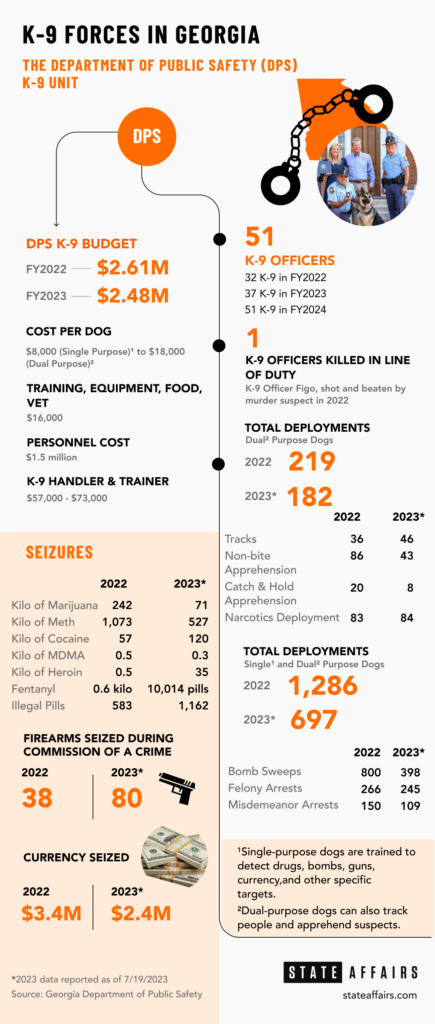
Drug and gang crime creating more work for K-9s
Matthews, a K-9 officer since 2007, said an uptick in drug- and gang-related crime in Atlanta and other metro areas over the past several years is driving the need for more K-9 teams. They’re increasingly called on to assist the Georgia Bureau of Investigation, the Federal Bureau of Investigation, the Drug Enforcement Agency (DEA) and other state and federal agencies in cases involving drugs, stolen cars and goods, and violent crime.
Last year 6,214 people were incarcerated for drug-related crimes in Georgia. About 60% of drug crimes involved methamphetamines.
DRUG-RELATED INCARCERATIONS IN GEORGIA, 2018 – 2022
| YEAR INMATE ADMITTED | FOR ANY DRUG CRIME | FOR METHAMPHETAMINE CRIME | FOR COCAINE CRIME | FOR MARIJUANA CRIME |
| 2018 | 8,105 | 3,913 | 2,258 | 1,844 |
| 2019 | 8,912 | 4,548 | 2,231 | 2,013 |
| 2020 | 4,803 | 2,616 | 1,123 | 1,040 |
| 2021 | 5,953 | 3,598 | 1,274 | 1,176 |
| 2022 | 6,214 | 3,707 | 1,272 | 1,367 |
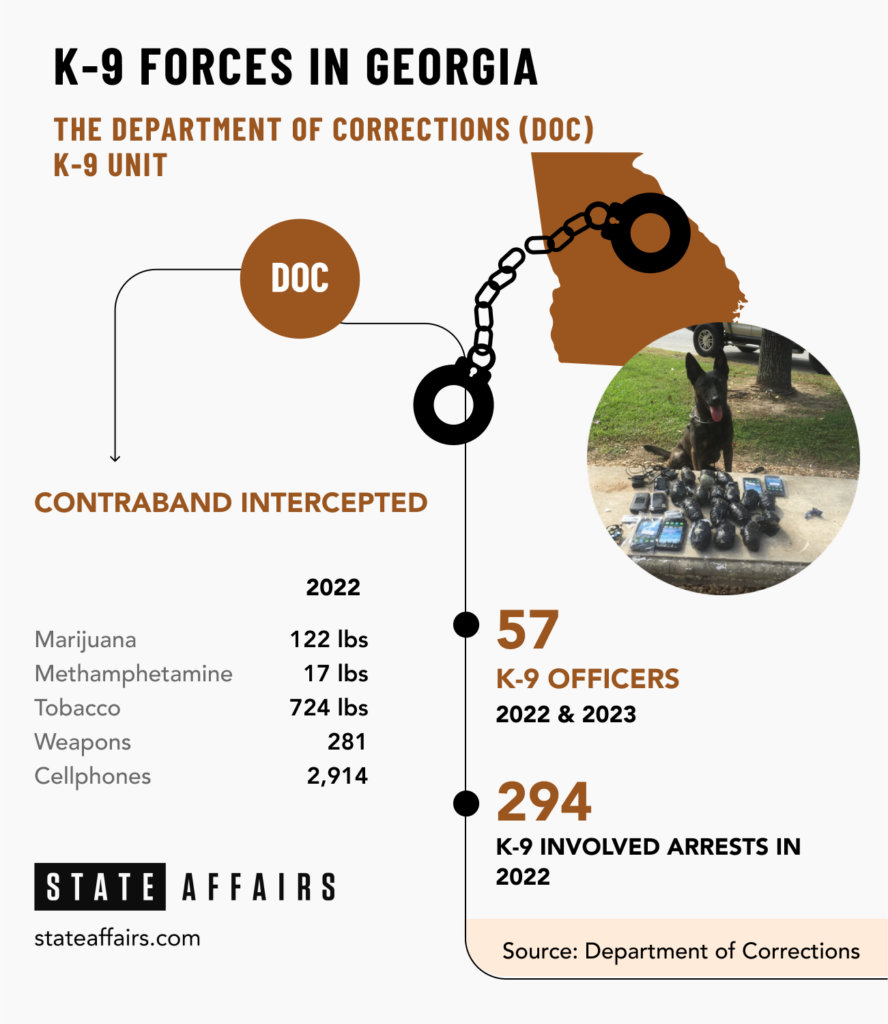
Meanwhile drug overdoses have been increasing in Georgia and nationally since the start of the COVID-19 pandemic.
The Georgia Department of Public Health reported that from 2019 to2021, the total number of opioid-related overdose deaths increased to 1,718 from 853, an increase of 101%. In 2021, there were 2,390 drug overdose deaths in Georgia; 71% were attributed to opioids and 57% were attributed to fentanyl, a powerful synthetic opioid. Non-fatal drug overdoses also increased. From 2019 to 2021, emergency department visits and hospitalizations for drug overdoses in Georgia rose to 27,388 from 24,886.
A typical K-9 deployment occurs when a DPS officer pulls someone over for a traffic violation. If the person seems overly nervous or suspicious, Matthews said, they’ll ask for consent to search the vehicle. Oftentimes suspects grant consent and they find illegal drugs and stolen goods. When they don’t, he said, the handler can direct the dog to sniff for drugs. If the dog detects a drug odor he’ll stop and signal its location.
Matthews recalled such a stop in Gwinnett with his former partner, K-9 Kayla, who detected 40 pounds of marijuana in a trunk, despite the drugs being vacuum-sealed inside hockey bags. “Marijuana has a very pungent smell, but we couldn’t smell it,” he said. “Her nose got us into the vehicle to be able to search it, and made it so that those drugs couldn’t continue on.”
K-9 partners filling the workforce gap
DPS spokesman Capt. Michael Burns said the K-9 teams are proving to help officers to be more effective. “A canine partner acts as a force multiplier and a loyal companion to our officers … and provides a safety net for them while on patrol,” Burns said.
That’s helpful at a time when the Georgia State Patrol is experiencing a serious workforce shortage, with close to 200 vacant positions.
MCCD Motor Carrier Officer 3 Micahiah Swain, 32, said his K-9 partner Ozon, a 6-year-old German short-haired Pointer, “always has my back. He’s always watching out for me.”
Swain said he’s very in tune with Ozon, and can tell when the dog smells the odor of narcotics by certain gestures. Ozon has found a good deal of cocaine, heroin and fentanyl hidden in compartments of tractor trailers. In 2021, Ozon found 50 kilos of cocaine in a trailer that turned out to be trafficked by a Mexican cartel. The case and the contraband were turned over to federal agents, he said.
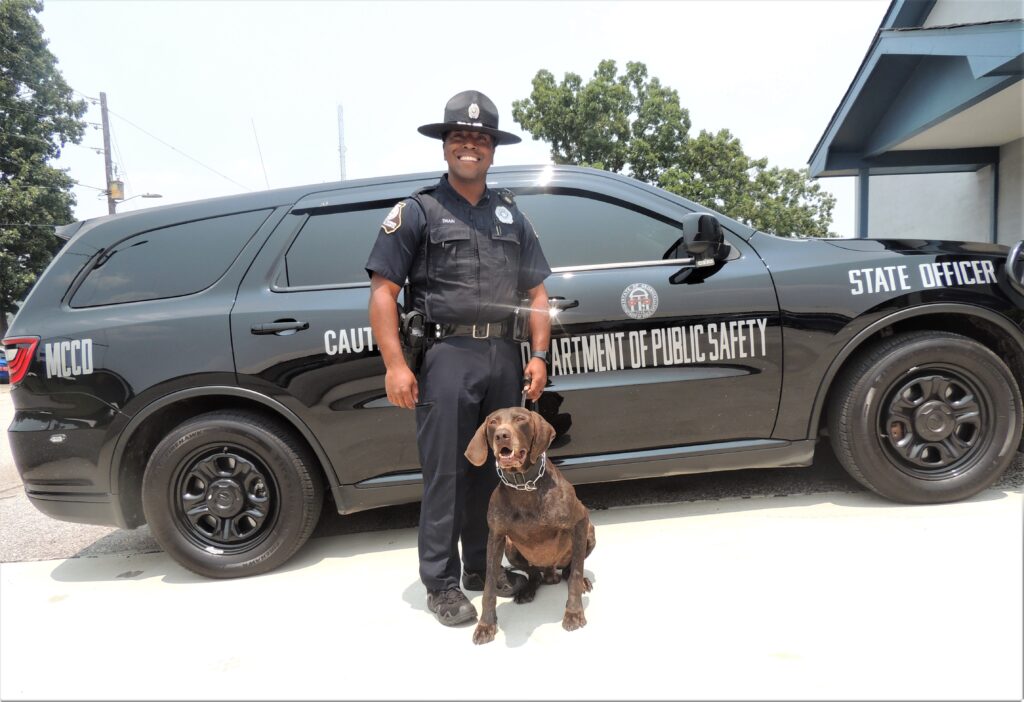
Swain said while Ozon’s crime-stopping job can be tough and stressful, he gets pampered at his home, where he’s considered the family dog. His wife and kids love to snuggle and play fetch with Ozon, and visit with him in his “canine castle,” a 20- by 10-foot kennel that has an air-conditioned indoor area.
“The bond that me and Ozon have is strong. That’s my buddy, my partner. I’ll keep him until he retires, and for the rest of his life,” said Swain.
Most DPS K-9 officers serve for eight to 10 years before retiring, and go on to live with their handlers, said Matthews. Figo is the only DPS K-9 killed in the line of duty since the program began in the 1980s, he said. Common injuries have included broken teeth, muscle sprains, cuts and heat exhaustion.
K-9s in the wild … and in the city
The duties of the K-9 officers who work for the state Department of Natural Resources (DNR) Law Enforcement Division are to track suspects and people, find evidence, detect wildlife, and apprehend suspected criminals. DNR added another dog to its K-9 unit this year, and now has eight K-9 teams.
Common deployments for DNR K-9s involve finding evidence hidden by people hunting and fishing illegally. That includes people who kill or catch too many deer, doves, ducks, alligators or fish beyond the legal limit for the season.
Such lawbreakers often hide evidence of their crimes, and the K-9s are usually up for the challenge, said Sgt. Brooks Varnell, the K-9 Coordinator for DNR.
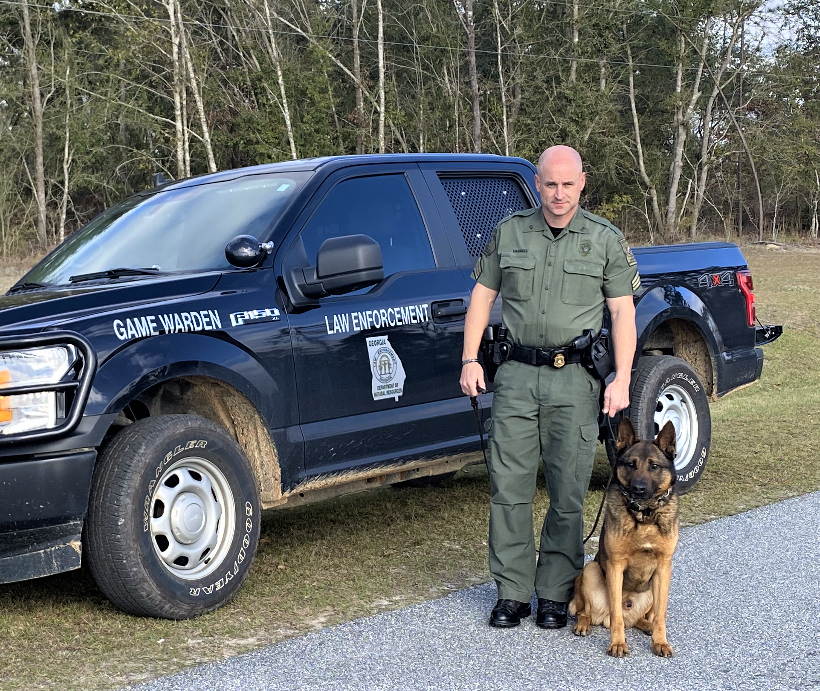
A few months ago, a convicted felon was hunting in the Oconee National Forest, and buried his rifle in the ground about 50 yards from his deer stand when he saw the game warden coming, said Varnell. Despite wearing full camouflage, the man insisted that he wasn’t hunting. Varnell’s K-9 partner Taz, a 7-year-old German Shepherd, made quick work of finding the buried rifle.
Many people hunt deer at night, sometimes shooting at them from their trucks on the road. “All highly illegal,” said Varnell, who often patrols woods and fields after midnight with Taz. He said Taz is adept at finding people hiding in the dark, as well as discarded guns, wildlife, clothing, and spent shells.
“They can find anything that has human odor on it, even from a hundred yards away,” he said.
In 2015, a coastal K-9 team caught a man trying to smuggle 84 loggerhead sea turtle eggs off of Sapelo Island. K-9 Titan sniffed out the man’s cooler before it left the ferry, Varnell said. Because sea turtles are a protected species, the man was later sentenced to 21 months in prison.
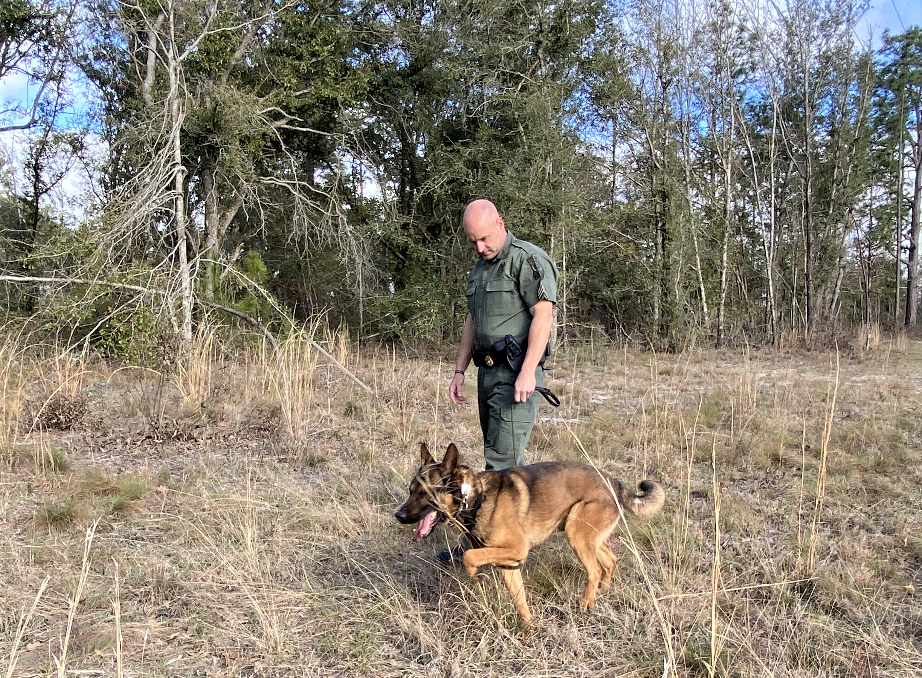
DNR K-9 teams also hunt for people who may be lost or in distress. K-9s have led numerous search-and-rescue efforts to find children and elderly people with dementia who wandered off into the woods. Varnell said he and his K-9 partners have also discovered meth labs and moonshine stills.
While they mostly handle misdemeanor violations, K-9 teams have been involved in numerous felony and death investigations at the behest of other agencies. Often the K-9 unit is called when a suspect has fled into the woods. Varnell said his former partner, K-9 Rock, found a gun used in a murder in Bartow County buried deep under a log.More recently, DNR K-9s have been deployed in metro Atlanta as part of the governor’s Crime Suppression Unit. Varnell said he and two of his K-9 handlers were providing security in the woods near the future Atlanta Public Safety Training Center in January when a protestor died after reportedly being shot by law enforcement. Varnell said the Georgia State Patrol officer who was shot during the incident is a K-9 handler whose canine partner was with him at the time.
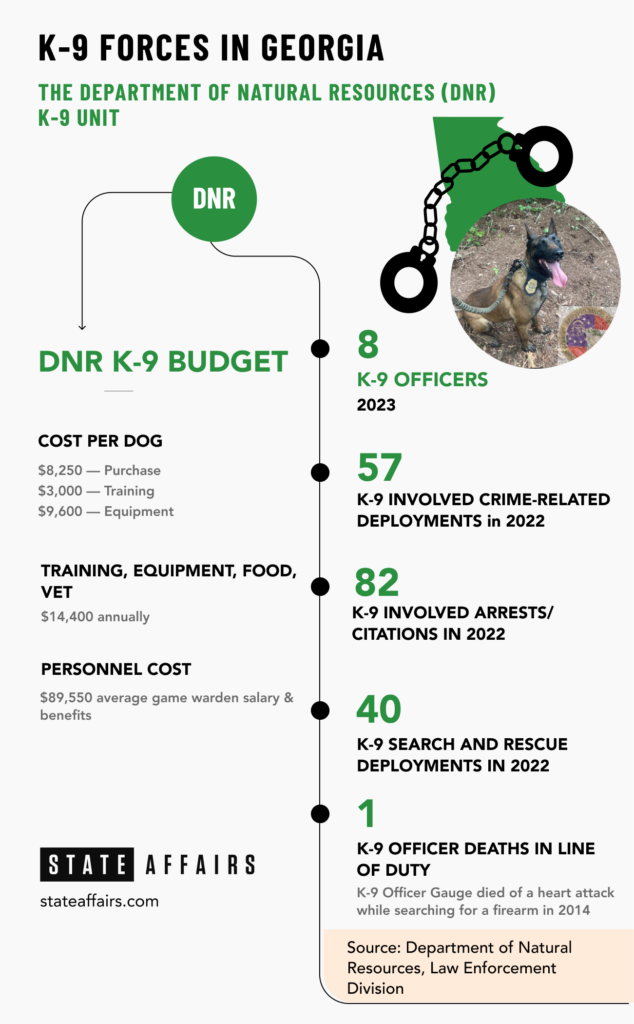
Support from legislators and the governor
The FY 2023 budget for the Department of Public Safety K-9 unit is nearly $2.5 million. For Fiscal Year 2024, the General Assembly appropriated $515,000 to procure, train and support 10 additional K-9 officers for DPS. Gov. Brian Kemp and his wife have been avid supporters of the state’s K-9 forces.
Besides investing in more K-9s, the Legislature also enacted a new law to protect them. According to SB 155, known as Figo’s Law, anyone who knowingly harms a K-9 officer or other public safety animal, including search and rescue dogs, will face increased penalties, including jail time and fines. The bill, signed by Kemp, received strong bipartisan support.
Have comments or tips on public safety issues? Contact Jill Jordan Sieder on Twitter @journalistajill or at [email protected].
Twitter @StateAffairsGA
Instagram @STATEAFFAIRSGA
Facebook @STATEAFFAIRSUS
LinkedIn @StateAffairs
Read this related story:
Professionals still face licensing delays amid state’s transition to online system
The Gist Georgia’s professionals and business owners are still struggling to obtain professional licenses in a timely manner. As the Secretary of State’s Office rolls out its new Georgia Online Application Licensing System to expedite the process, the efficiency of this new process is being put to the test. What’s Happening Thursday morning at the …
Controversy over AP African American Studies class grows
Rashad Brown has been teaching Advanced Placement African American Studies at Atlanta’s Maynard Jackson High School for three years. He’ll continue to do so — even though the state’s top education official removed it from the list of state-funded course offerings for the upcoming school year. While Brown prepares to start teaching his class on …
Students, teachers, lawmakers blast decision to end AP African American history classes
ATLANTA — A coalition of lawmakers, civil rights leaders, clergy, educators and students Wednesday called on the state’s education czar to rescind his decision to drop an advanced placement African American studies class from the state’s curriculum for the upcoming school year. “This decision is the latest attack in a long-running GOP assault on Georgia’s …
Kamala Harris’ presidential bid reinvigorates Georgia Democrats
Georgia Democrats have gained new momentum heading into the November election, propelled by President Joe Biden’s decision to bow out of his reelection bid and hand the reins to Vice President Kamala Harris. The historic decision, announced Sunday, is expected to prove pivotal in the national and state political arenas and breathe new life and …




